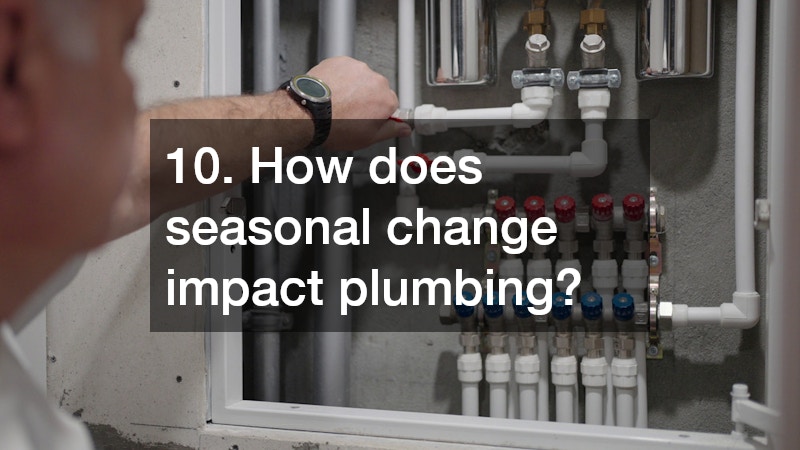Understanding plumbing issues can save homeowners time, money, and stress. This article explores essential plumber facts you need to know, addressing common questions and offering valuable insights into maintaining your home’s plumbing systems. Armed with this knowledge, you’ll be better prepared to tackle common problems and maintain the longevity of your household plumbing.
A good starting point is learning how your plumbing system works as a whole. From the network of supply lines that bring clean water into your home to the drains and sewer lines that carry wastewater away, each part plays a vital role. Familiarizing yourself with this setup makes it easier to identify where problems might occur. For example, recurring clogs in a specific sink may point to a localized issue, while slow drainage throughout the house could signal a larger problem in the main sewer line.
Another valuable fact for homeowners is the importance of water pressure. While high pressure may seem desirable, it can actually strain pipes, joints, and appliances, eventually leading to leaks or bursts. Installing a pressure regulator helps protect your system and extends its lifespan. Similarly, knowing the average life expectancy of plumbing components—such as water heaters, fixtures, and pipes—can help you plan timely replacements before failures occur.
Preventive maintenance also goes a long way toward avoiding emergencies. Simple steps like avoiding grease disposal in sinks, cleaning hair out of shower drains, and scheduling periodic inspections from a professional plumber all contribute to a healthier, longer-lasting system. By taking the time to understand these plumbing basics, homeowners gain confidence, reduce the likelihood of costly surprises, and ensure their home remains both comfortable and functional for years to come.
1. What are the most common plumbing problems?

The most prevalent plumbing issues often involve leak detection, clogged drains, and malfunctioning fixtures. Leak detection is crucial as undetected leaks can lead to water damage and increased utility bills. Understanding these common problems is the first step in effective home maintenance.
Many homeowners face challenges with drip leaks under sinks or leaking faucets. Promptly addressing these issues can prevent minor inconveniences from becoming major repairs. Basic plumber facts include recognizing the signs of such leaks early on.
Beyond leaks, slow or clogged drains frequently affect households. This problem can result in backed-up systems and unsanitary conditions, highlighting the importance of regular drain cleaning. Proper maintenance can lessen these problems significantly.
2. How to prevent plumbing emergencies?
Preventive care is the key to avoiding plumbing emergencies. Regular water heater repair service ensures that your heating system functions efficiently, reducing the risk of unexpected breakdowns. Scheduling routine maintenance can avert future problems.
Proactive measures such as inspecting water supply lines and replacing old components can save homeowners from emergencies. Another essential plumber fact involves knowing when to call in professionals for repairs and maintenance. This practice mitigates risks before they become urgent problems.
Furthermore, consider installing water alarms and sump pumps in flood-prone areas of your home. These tools provide warnings of moisture problems in advance, giving you time to act. Together, these measures help maintain your plumbing system’s health.
3. What should you look for when hiring a plumber?
When searching for reliable plumbing services, consider the plumber’s qualifications and experience. Checking for licenses and customer reviews is vital to ensure quality service for your local septic tank service needs. This diligence helps ensure you hire reputable professionals.
Look for a plumber who offers a comprehensive range of services, from sewer line repair to water heater maintenance. This versatility indicates a well-rounded skill set, which can be beneficial for future services. Choosing a versatile plumber can be advantageous in emergencies.
It’s also wise to hire someone offering transparent pricing and clear communication. An affordable plumber with upfront pricing allows for better budget planning. Good communication ensures your expectations align with their services.
4. How does a plumber find hidden leaks?

Detecting hidden leaks is intricate, often requiring specialized equipment. Plumbers employ leak detection techniques using advanced tools such as thermal imaging cameras and acoustic sensors. These methods reveal leaks that might otherwise remain undetected.
Infrared cameras scan for temperature variations that indicate moisture behind walls and ceilings. This non-invasive approach helps avoid unnecessary damage. Plumber facts emphasize the significance of using technology for effective leak detection.
Moreover, experienced plumbers may use pressure testing to identify weaknesses within the plumbing system. This test pinpointed discrepancies in expected water pressure, indicating leaks or blockages. These insights are crucial for planning targeted sewer line repair.
5. What are eco-friendly plumbing solutions?
Eco-friendly plumbing solutions reduce water waste and lower energy consumption. Modern plumbing fixtures, such as low-flow taps and dual-flush toilets, conserve water without sacrificing performance. Implementing these options is a sustainable step forward.
Plumbers can also recommend high-efficiency water heaters that use less energy while providing an adequate hot water supply. Replacing outdated models with newer, more efficient units is a wise investment. These efficient water heaters contribute to a household’s reduced carbon footprint.
Additionally, regular drain cleaning ensures optimal system performance, which prevents unnecessary water and energy use. Clear drains facilitate efficient water flow, minimizing resource waste. Keeping plumbing systems transparent is vital for maintaining eco-efficiency.
6. How to safely clear a clogged drain?
When addressing clogged drains, it’s essential to avoid harsh chemicals. These can damage pipes and negatively affect groundwater. Instead, try using a plunger or a plumber’s snake for manual clog removal.
Home remedies, such as baking soda and vinegar mixtures, offer a chemical-free option for minor blockages. Pour the mixture down the drain, followed by boiling water to dislodge the obstruction. These methods are safe for most home plumbing systems.
If these attempts fail, consult a professional for severe blockages. A plumber’s expertise and equipment, like a professional-grade auger, provide efficient and safe solutions. Also, maintaining sump pump systems is crucial for managing excess water effectively.
7. What are the signs you need a professional plumber?

Certain signs indicate it’s time to call an emergency plumber. Persistent clogged drains, unexplained water bill increases, and unusual noises from pipes suggest underlying issues. These problems often require professional attention beyond basic homeowner skills.
Furthermore, unexpected plumbing events like sewer backups or severe leaks necessitate immediate assistance. These emergencies pose health risks and structural damage, warranting prompt professional intervention. Understanding these situations is part of essential plumber facts.
Regular plumbing checks also help in identifying potential issues early. Professionals can detect subtle warnings, ensuring timely repairs before problems escalate. Staying ahead of plumbing issues is critical for system longevity.
8. How does water pressure affect plumbing?
Water pressure directly impacts your plumbing system’s performance and durability. Excessive pressure can cause stress on pipes, leading to leaks or bursts. Monitoring and adjusting water pressure is crucial for system health. Homeowners can easily check their water pressure using an inexpensive gauge that attaches to a faucet. Ideal residential water pressure typically falls between 40 and 60 psi; anything outside this range can shorten the lifespan of pipes and fixtures.
Conversely, low pressure can indicate blockages or failing components. This issue might require inspection and possibly options to enhance system performance. For instance, clogged aerators, sediment buildup in water heaters, or issues within the municipal supply line can all contribute to reduced flow. In some cases, installing a booster pump may help restore adequate pressure throughout the home. These pressure-related issues underscore the importance of regular checks and preventative maintenance.
Another aspect of plumber facts is knowing how pressure affects appliances like water heaters. Proper pressure settings ensure safe and efficient heater operation. Excessive pressure can damage the heater’s tank or even trigger the relief valve, while insufficient pressure may prevent hot water from reaching distant fixtures. Regular maintenance includes checking these settings for optimal performance. By understanding how water pressure influences both plumbing lines and appliances, homeowners can prevent costly repairs, extend system longevity, and ensure consistent water flow for everyday needs.
9. What plumbing tools should homeowners have?
A basic plumbing toolkit enables homeowners to perform minor maintenance and quick fixes. Essential tools include a plunger, adjustable wrench, plumber’s tape, and a pipe wrench. Having these on hand can help manage small leaks or clogs. Keeping these items organized in one place ensures they are accessible when needed, saving valuable time in an emergency.
A drain snake is also a valuable tool for stubborn blockages. Homeowners equipped with a basic auger can handle many drain issues themselves before needing professional intervention. These tools are sometimes sufficient for simple problems like clearing hair from bathroom drains or removing food particles from kitchen sinks. In many cases, using a drain snake is safer for your pipes than chemical drain cleaners, which can corrode plumbing over time.
Beyond the basics, a bucket, plumber’s putty, and a pair of durable gloves can also prove useful. A bucket helps contain water when disconnecting pipes, while plumber’s putty provides a simple seal for minor leaks around fixtures. Gloves protect hands from sharp edges and dirty water during repairs.
Additionally, keeping a contact for septic pumping services is wise for homes with septic systems. Regular pumping prevents overflow and prolongs the life of the septic tank. Basic preparedness includes having necessary tools and professional contacts, allowing homeowners to handle minor problems confidently while knowing when to call in expert help. This combination of readiness and professional support keeps plumbing systems reliable and reduces the likelihood of costly emergencies.
10. How does seasonal change impact plumbing?

Seasonal changes can significantly affect a home’s plumbing system. Colder temperatures increase the risk of frozen pipes, leading to potential bursts and disruptions. Knowing how to insulate exposed pipes is vital for winter preparedness. Taking proactive measures—such as draining outdoor spigots, wrapping pipes in unheated areas, and keeping indoor temperatures steady—can save homeowners from costly emergencies when temperatures drop. Even leaving faucets slightly dripping on extremely cold nights helps reduce the likelihood of freezing.
During warmer months, increased water usage can strain systems, highlighting the need for efficient plumbing management. Families often use more water for gardening, lawn irrigation, filling pools, or frequent showers. This added demand can expose hidden leaks, put pressure on older pipes, and increase utility bills. Regular checks and maintenance help sustain efficiency and prevent overuse problems. An affordable plumber can provide essential seasonal services such as checking irrigation systems, inspecting outdoor faucets, and ensuring that your water lines are free of leaks.
Additionally, seasonal shifts dictate maintenance schedules for systems like water heaters and sump pumps. For instance, sump pumps are particularly important during rainy spring months when basements face a higher risk of flooding. Water heaters, on the other hand, benefit from flushing in the fall to remove sediment buildup before winter’s heavy usage. Adapting to these changes ensures year-round efficiency and system health. Timely attention to these shifts is a key part of managing your home’s plumbing, reducing the risk of unexpected breakdowns, and extending the life of your system.
Conclusion
Grasping these plumber facts empowers homeowners to better manage their plumbing systems, ensuring efficiency and longevity. With this knowledge, identifying issues early and preventing costly repairs becomes more attainable. Additionally, knowing when to call in expert help is crucial for maintaining your plumbing’s integrity.
One of the most valuable aspects of plumbing knowledge is the ability to recognize warning signs before they escalate into emergencies. Slow drains, unusual noises in the pipes, or a sudden spike in your water bill can all be indicators of hidden issues. By paying attention to these small changes, homeowners can take proactive steps—such as checking for leaks, cleaning out drains, or consulting a plumber—before the damage worsens. This preventative approach saves not only money but also time and unnecessary stress.
Understanding how your plumbing system is structured is equally important. Simple awareness of where the main shut-off valve is located, for example, can prevent catastrophic flooding in the event of a burst pipe. Regularly inspecting water heaters, faucets, and outdoor spigots also keeps everything functioning smoothly. Even seasonal tasks, such as draining outdoor pipes before winter, play a major role in protecting your home.
Equipped with a basic foundation of plumbing facts, homeowners are better prepared to decide which tasks can be handled through DIY maintenance and which require professional intervention. This balance helps extend the life of the system while keeping repair costs manageable. Ultimately, informed homeowners make smarter choices, preserve their property’s value, and gain peace of mind knowing their plumbing is well cared for.



